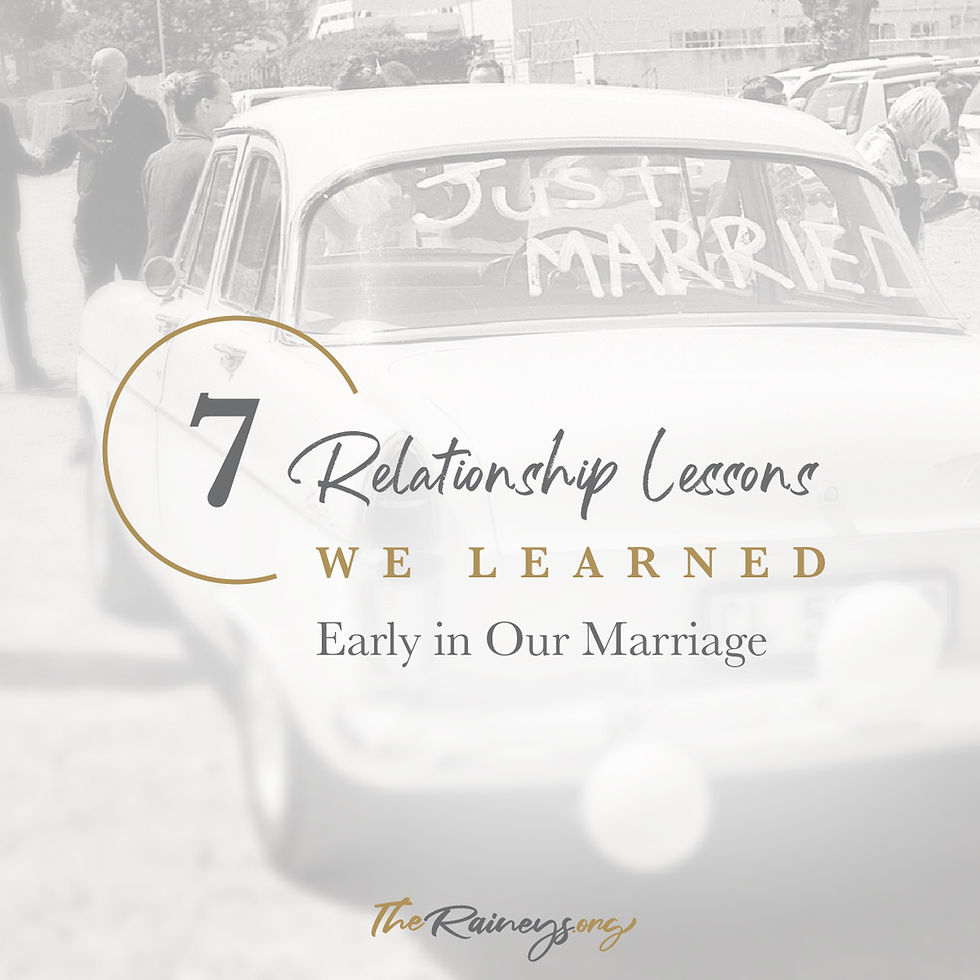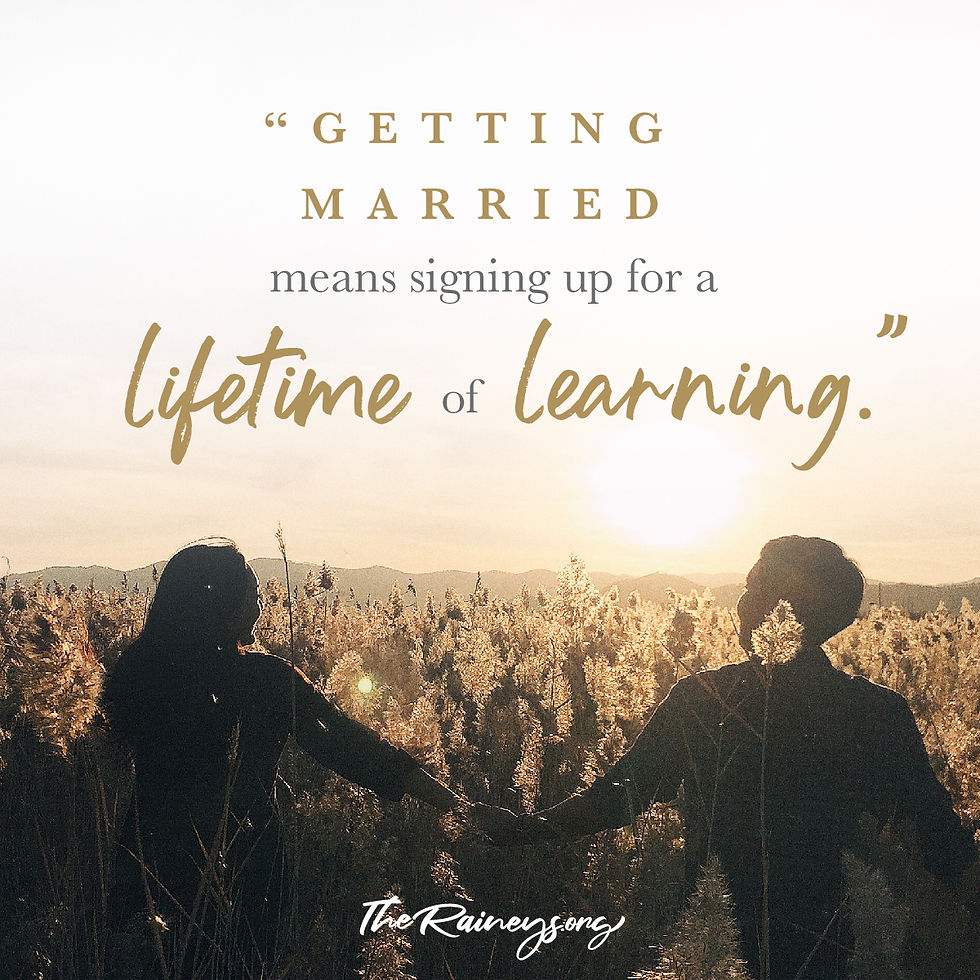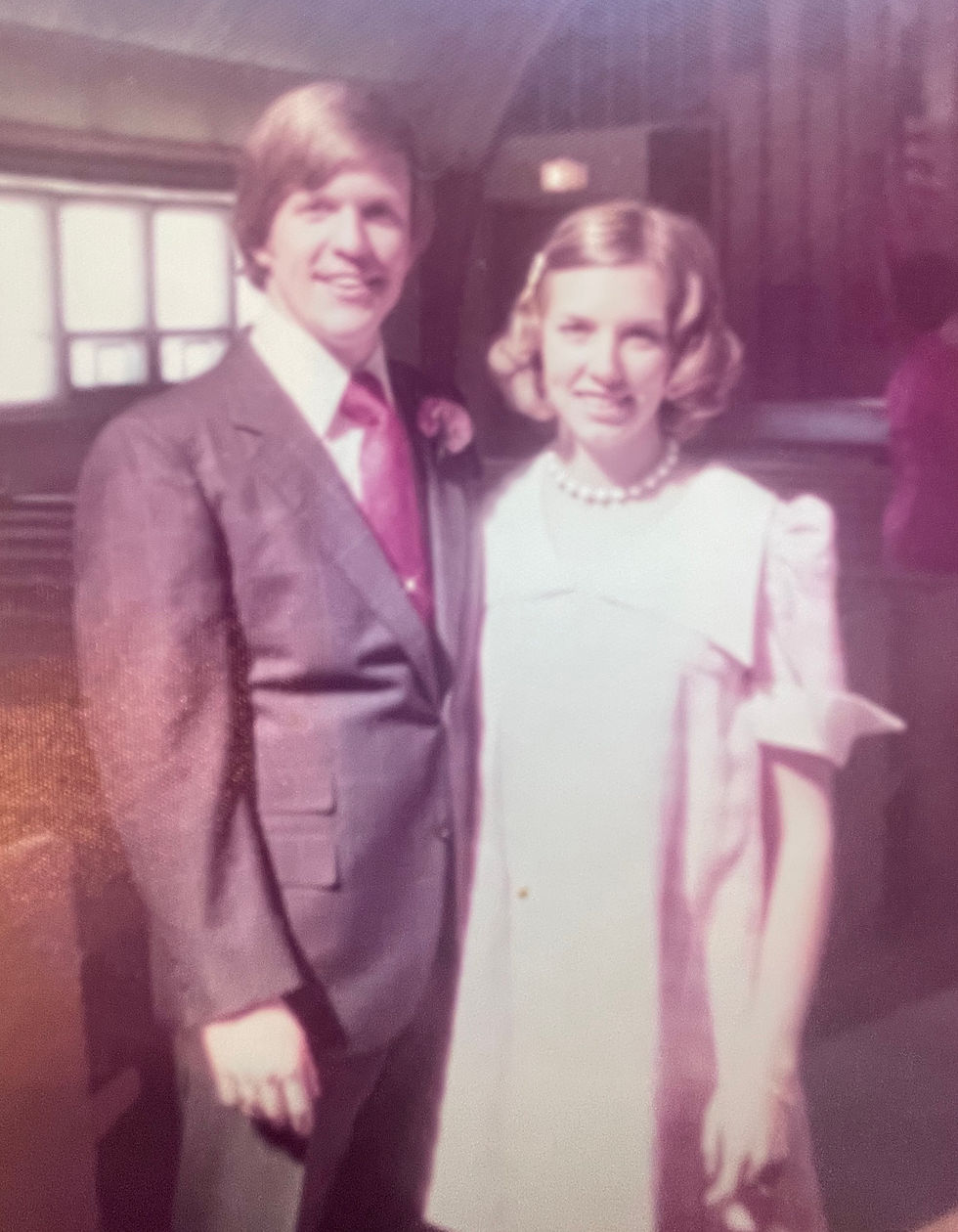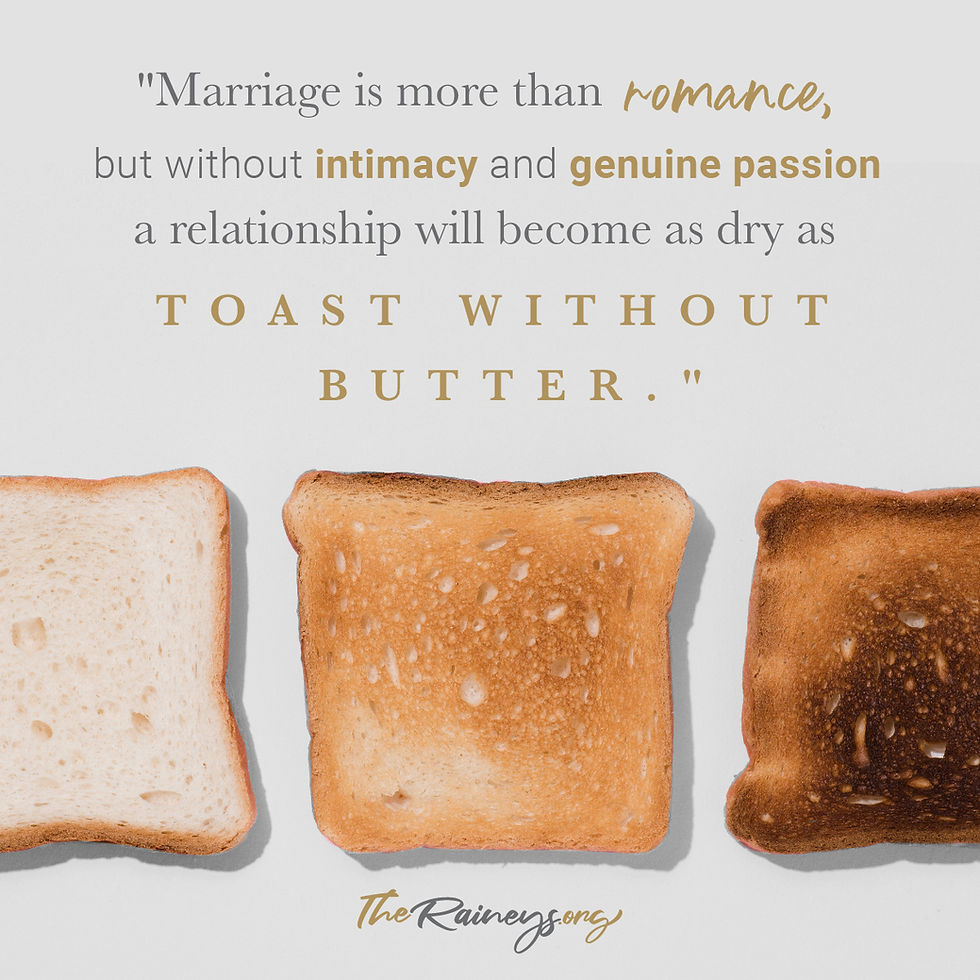7 Relationship Lessons We Learned Early in Our Marriage
- Dennis Rainey

- Jan 28, 2022
- 7 min read
By Dennis Rainey

Nearly five decades ago, Barbara and I stopped at an overlook on Highway 36 just outside Boulder, Colorado. We had been married only a few days, and we were driving to our little apartment in Boulder. I pulled over to show her our new home’s setting.
At that point all we had were wedding gifts, the same last name, a solid four-year friendship, and a few days of experiences together. Our family was brand new.
And did we ever have a lot to learn. A LOT!!!
I look back now at that couple standing at that overlook and I think, “We were just kids.” Fortunately, we had a good foundation for our marriage—our faith in Jesus Christ. But we knew nothing of what the future held or what we would need to learn about how to build a marriage that would last a lifetime.

Getting married means signing up for a lifetime of learning. You learn some important lessons in the first year or two … and then you spend the rest of your lives relearning them! Here are some examples of some of these relationship lessons:
1. Marriage means commitment to God and your spouse.
In Genesis 2:24 we find the importance of commitment: “Therefore a man shall leave his father and mother and hold fast to his wife, and they shall become one flesh.”
“Hold fast” means to stick like super glue. Permanent. It’s a covenant between a husband and wife before almighty God to stick, to stay and to never stray. At the headwaters of a family is a promise of two imperfect people who promise to love
At its core, marriage is a lifelong promise to God and your spouse … not merely to stay married but to love each other totally and unconditionally. For us that seemed easy before we were married, but afterward we learned that this commitment involves a lifetime of hard work.
During our wedding, Barbara and I pledged to stand by each other “in riches and in poverty, in joy and in sorrow, in sickness and in health.” When I looked in Barbara’s eyes and said my vows, I meant every word. But in our fourth year of marriage, Barbara nearly died with a serious health crisis that tested the depth of my commitment.
Understandably, Barbara became preoccupied with her health. For months there weren’t many romantic feelings in our relationship. But I had promised to stand by her. Barbara couldn’t give much to me, but she needed my love more than ever. That’s what commitment comes down to—digging your fingers into a rock and hanging on when it feels as if your marriage might slide off a cliff.
It's the right thing to do.

2. Deny yourself.
As a single man, I enjoyed my Saturdays; I might go fishing or watch sports on television … whatever I wanted. I’ll never forget one of our first weekends together after the honeymoon. Barbara didn’t want me to flop in front of the television; she had a list of things she wanted me to do.
All of a sudden reality hit me like a blast of chilly arctic air: I can’t do what I want to do on Saturday anymore! I have someone else’s needs to consider besides my own. That was a startling realization—I couldn’t live my life as I had in the past. Early on the number one lesson I learned was how selfish I was. I needed to set aside my desires and deny myself to love Barbara well.
Since then, we’ve made great strides, but occasionally selfishness has showed its ugly face in our relationship. We have discovered that at the heart of a great marriage must be two people who know how to deny themselves. If both people are willing to sacrifice their own desires, it’s amazing how individual needs are met over time.
A great passage of Scripture that should be an anchor point for every marriage is Philippians 2:3-4: “Do nothing from selfish ambition or conceit, but in humility count others more significant than yourselves. LET EACH OF YOU LOOK NOT ONLY TO HIS OWN INTERESTS, BUT ALSO TO THE INTEREST OF OTHERS.” (CAPITALIZATION IS MINE)
3. Respect your differences.
I’ll never forget the feelings of being trapped that hit me not long after the honeymoon. Barbara was so different from me. We would go to parties and she would follow me around the room, hardly ever speaking, clinging to me like Velcro. I had more of an outgoing personality, but she was struggling with her self-confidence. What was going on?
And Barbara had similar questions about me. Some of my “endearing traits” made her feel so confined that one day she locked herself in the bathroom, thinking, What in the world am I going to do? I can’t get away from this!
A fork loomed in the road of our marriage. Was I going to love her or criticize her for her apparent “weaknesses”? Would she love me in spite of my grating weakness?
Fortunately, we made the right choices—to hang tough, to accept and cherish each other. They key was that each of us decided to respect the other person’s uniqueness and to work on understanding how to let our differences bind instead of divide us.

4. Pump life into your relationships by making communication a priority.
Barbara and I became good friends before we got overly serious in our relationship. We spent hours going on picnics, exploring outdoors, shopping, and even fishing. And we talked and talked, sometimes forgetting the clock until 1-2 a.m.
When we married and were together all the time, the discussions past midnight no longer seemed necessary or productive. Then six children came over a ten-year period. Since communication takes energy (and we struggled with having some left over at the end of the day), we didn’t talk as openly, frequently, and deeply. It took some frustration to realize that when communication in a marriage is ignored, problems are likely to be ignored too.
For a relationship to grow and bloom, partners need time to communicate—time to listen and speak, time to be real, time to share disappointments, frustrations, and failures. And time to truly understand one another.
5. Resolving conflict is an act of the will.
Once in just a few hours, because of a sickening run of insensitive words and actions, I hurt Barbara’s feelings—big time. She was steaming; I was oblivious. A bomb was ticking in our relationship.
A long day had exhausted me, and though I knew Barbara was upset about something, I was so tired I eagerly crawled into bed. A few minutes later Barbara joined me, but instead of giving me a goodnight kiss, she grabbed a pillow and smacked me on the head! And it wasn’t a playful whack either.
That made me mad. I rolled over to stare at the wall. My nonverbal message shouted, I don’t want anything to do with you!
“Don’t you want to talk?” Barbara asked.
I grunted a noncommittal answer.
A long, long silence followed.
Finally, in a chilly monotone, I said, “Sweetheart, neither one of us is doing well in this relationship at the moment. Let’s reschedule our conflict for tomorrow because we’re not getting anywhere.”
“Okay,” she said softly. We turned out the lights and tried to pretend we had not let the sun go down on our anger.
In the darkness I was wide awake, still red hot, facing the wall. But as the hours ticked away, my simmering sulk dissipated. I knew my attitude was wrong, and I asked God to take away my anger and desire to punish Barbara.
The mood was still tense the next day when I told Barbara I had blown it and was sorry. She said she was sorry, too, especially for blasting me with the pillow. Even though our feelings were still raw, we used a classic approach to negotiate an end to our conflict: We spent time talking as an act of our will, and we forgave each other as an act of the will.
6. Never stop working on your passion and intimacy.
Marriage is more than romance, but without intimacy and genuine passion a relationship will become as dry as toast without butter.

I may have been a country boy from the hills of southwest Missouri, but I knew our honeymoon needed to have a romantic flair—on a budget! While Barbara engineered the wedding plans, I spent weeks meticulously detailing a thrifty, fourteen-day trip in the Colorado Rockies.
We camped out (one night in the snow) and also stayed in a cabin by a roaring river (a wedding gift). There was plenty of time to talk and share our thoughts and dreams—the perfect environment to know each other better. Our honeymoon was an all-time memory maker.
Before you marry, attaining emotional intimacy seems easy. You draw close like a magnet pulling in a piece of metal. But it didn’t take Barbara and me long to learn that, after marriage, the forces feel reversed, and passion and closeness take persistence and the investments of a lifetime of hard work.
Throughout our marriage, Barbara has allowed me to know her fully, and I, too, have risked letting her learn what’s inside me. But this didn’t come naturally for us. It has taken years of sharing, adjusting—and yes, some arguing—to find the total communication of body, soul, and spirit.

7. Develop a common vision for your marriage.
Many marriages consist of two purposeful and successful people who are unable to arrive at a common vision as a couple. They are like two contractors building the same house from two sets of blueprints.
It’s not going to be a good outcome.
Although I had known about God and the Bible when I was growing up, I didn’t take God seriously and give control of my life to Him until I was in college. I was excited to learn that Barbara shared this passion.
Because we both knew that our differences and our selfish inclinations had the potential to turn our romantic dream into a disaster, we agreed that God would need to be the center of our marriage. I am convinced that this joint vision to God our very best not only cemented us together as a couple but has given us individual purpose, direction, and significance in all of life.
I wouldn’t want to put at risk our relationship by not seeking God’s direction and help continually … learning His vision for us as individuals as well as a couple.
So there you have them—seven lessons we learned as a young couple. Wherever you are in your marriage, these core principles can bring you safely through life’s storms to a safe harbor. When you’re not sure what to do in your marriage, stick to the basics.
As I reflect back on lessons we learned, I’m reminded of a line in one of Thornton Wilder’s plays, “The Skin of Our Teeth.” It reminds me of the power of the promise that created our marriage:
“I didn't marry you because you were perfect. I didn't even marry you because I loved you. I married you because you gave me a promise. That promise made up for your faults. And the promise I gave you made up for mine. Two imperfect people got married and it was the promise that made the marriage. And when our children were growing up, it wasn't a house that protected them; and it wasn't our love that protected them—it was that promise.”
Dennis Rainey
Psalm 127:1
This is too good to keep to yourself! Share with a friend or family member using the links below!
Are you a TheRaineys.org Family Member? If not, stop missing out by clicking here.







Comments